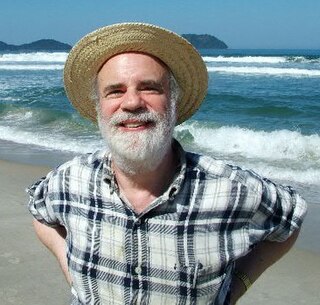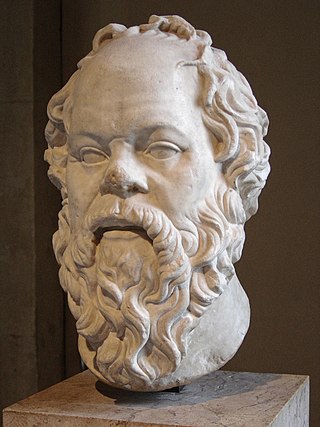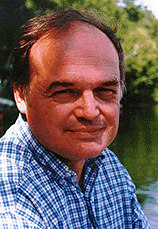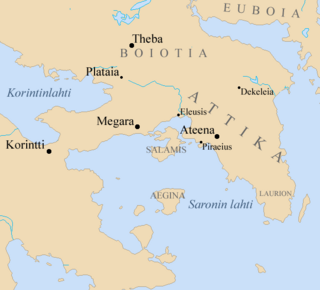
Eubulides of Miletus was a philosopher of the Megarian school who is famous for his paradoxes.
Propositional calculus is a branch of logic. It is also called propositional logic, statement logic, sentential calculus, sentential logic, or sometimes zeroth-order logic. It deals with propositions and relations between propositions, including the construction of arguments based on them. Compound propositions are formed by connecting propositions by logical connectives. Propositions that contain no logical connectives are called atomic propositions.
In propositional logic, modus ponens, also known as modus ponendo ponens, implication elimination, or affirming the antecedent, is a deductive argument form and rule of inference. It can be summarized as "P implies Q.P is true. Therefore Q must also be true."
In propositional logic, modus tollens (MT), also known as modus tollendo tollens and denying the consequent, is a deductive argument form and a rule of inference. Modus tollens takes the form of "If P, then Q. Not Q. Therefore, not P." It is an application of the general truth that if a statement is true, then so is its contrapositive. The form shows that inference from P implies Q to the negation of Q implies the negation of P is a valid argument.

Chrysippus of Soli was a Greek Stoic philosopher. He was a native of Soli, Cilicia, but moved to Athens as a young man, where he became a pupil of the Stoic philosopher Cleanthes. When Cleanthes died, around 230 BC, Chrysippus became the third head of the Stoic school. A prolific writer, Chrysippus expanded the fundamental doctrines of Cleanthes' mentor Zeno of Citium, the founder and first head of the school, which earned him the title of the Second Founder of Stoicism.

Saul Aaron Kripke was an American analytic philosopher and logician. He was Distinguished Professor of Philosophy at the Graduate Center of the City University of New York and emeritus professor at Princeton University. Kripke is considered one of the most important philosophers of the latter half of the 20th century. Since the 1960s, he has been a central figure in a number of fields related to mathematical and modal logic, philosophy of language and mathematics, metaphysics, epistemology, and recursion theory.

A syllogism is a kind of logical argument that applies deductive reasoning to arrive at a conclusion based on two propositions that are asserted or assumed to be true.

Friedrich Ludwig Gottlob Frege was a German philosopher, logician, and mathematician. He was a mathematics professor at the University of Jena, and is understood by many to be the father of analytic philosophy, concentrating on the philosophy of language, logic, and mathematics. Though he was largely ignored during his lifetime, Giuseppe Peano (1858–1932), Bertrand Russell (1872–1970), and, to some extent, Ludwig Wittgenstein (1889–1951) introduced his work to later generations of philosophers. Frege is widely considered to be the greatest logician since Aristotle, and one of the most profound philosophers of mathematics ever.

The history of logic deals with the study of the development of the science of valid inference (logic). Formal logics developed in ancient times in India, China, and Greece. Greek methods, particularly Aristotelian logic as found in the Organon, found wide application and acceptance in Western science and mathematics for millennia. The Stoics, especially Chrysippus, began the development of predicate logic.
In philosophy of logic and logic, a rule of inference, inference rule or transformation rule is a logical form consisting of a function which takes premises, analyzes their syntax, and returns a conclusion. For example, the rule of inference called modus ponens takes two premises, one in the form "If p then q" and another in the form "p", and returns the conclusion "q". The rule is valid with respect to the semantics of classical logic, in the sense that if the premises are true, then so is the conclusion.

George Stephen Boolos was an American philosopher and a mathematical logician who taught at the Massachusetts Institute of Technology.
Compatibilism is the belief that free will and determinism are mutually compatible and that it is possible to believe in both without being logically inconsistent.

The Megarian school of philosophy, which flourished in the 4th century BC, was founded by Euclides of Megara, one of the pupils of Socrates. Its ethical teachings were derived from Socrates, recognizing a single good, which was apparently combined with the Eleatic doctrine of Unity. Some of Euclides' successors developed logic to such an extent that they became a separate school, known as the Dialectical school. Their work on modal logic, logical conditionals, and propositional logic played an important role in the development of logic in antiquity.
Logic is the formal science of using reason and is considered a branch of both philosophy and mathematics and to a lesser extent computer science. Logic investigates and classifies the structure of statements and arguments, both through the study of formal systems of inference and the study of arguments in natural language. The scope of logic can therefore be very large, ranging from core topics such as the study of fallacies and paradoxes, to specialized analyses of reasoning such as probability, correct reasoning, and arguments involving causality. One of the aims of logic is to identify the correct and incorrect inferences. Logicians study the criteria for the evaluation of arguments.

Hellenistic philosophy is Ancient Greek philosophy corresponding to the Hellenistic period in Ancient Greece, from the death of Alexander the Great in 323 BC to the Battle of Actium in 31 BC. The dominant schools of this period were the Stoics, the Epicureans and the Skeptics.
David Neil Sedley FBA is a British philosopher and historian of philosophy. He was the seventh Laurence Professor of Ancient Philosophy at Cambridge University.

Stoicism is a school of Hellenistic philosophy that flourished in Ancient Greece and Ancient Rome. The Stoics believed that the practice of virtue is enough to achieve eudaimonia: a well-lived, flourishing life. The Stoics identified the path to achieving it with a life spent practicing certain virtues in everyday life such as courage or temperance and living in accordance with nature. It was founded in the ancient Agora of Athens by Zeno of Citium around 300 BC.
Free will in antiquity is a philosophical and theological concept. Free will in antiquity was not discussed in the same terms as used in the modern free will debates, but historians of the problem have speculated who exactly was first to take positions as determinist, libertarian, and compatibilist in antiquity. There is wide agreement that these views were essentially fully formed over 2000 years ago. Candidates for the first thinkers to form these views, as well as the idea of a non-physical "agent-causal" libertarianism, include Democritus, Aristotle, Epicurus, Chrysippus, and Carneades.
Stoic logic is the system of propositional logic developed by the Stoic philosophers in ancient Greece.








